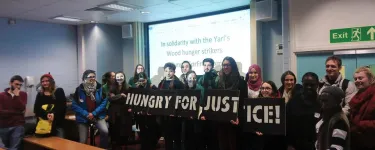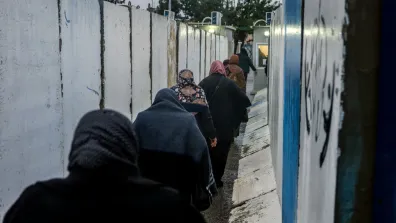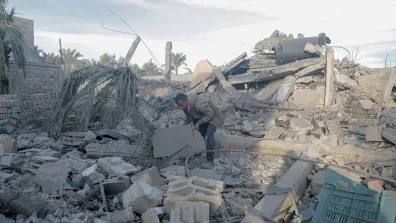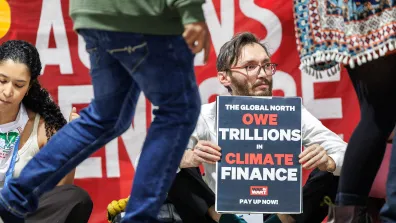Israeli Apartheid Week demonstrates students’ commitment to intersectional struggle

The 14th international Israeli Apartheid Week (IAW) was successfully launched on more than 25 university campuses in the UK over the last month, with hundreds of attendees. Students held events promoting critical, intersectional perspectives on Israel’s system of oppression of Palestinians, connecting with other struggles for justice in the UK and beyond.
Events aimed to educate fellow students, but also to encourage them to take action by getting involved with their campus Palestine society. Panels, workshops, poetry nights, film screenings and cultural events were held, highlighting Palestinian narratives and building awareness and support for the Palestinian-led Boycott, Divestment & Sanctions (BDS) movement. Many of the events this year coincided with the UCU strike, and students worked together with strike committees to shift their events away from university buildings and onto the teach-out schedules, so as not to cross the picket line.
This year’s IAW took place against a backdrop of worrying developments on the ground in Palestine. 2018 has already seen the USA deepen its commitment to Israel’s settler-colonial project, with President Donald Trump announcing plans to move the US embassy to Jerusalem on 15t May. The date coincides with Nakba Day, when Palestinians commemorate the forced removal of over 750,000 Palestinians from their homes and destruction of over 500 villages and towns, which led to Israel’s creation. While the UK government has expressed concern over the USA’s moves, the UK itself continues its complicity with Israel’s ongoing colonisation of Palestine, in particular through its arms trade with Israel, worth millions of pounds.
A major focus of this year’s IAW was the key role artists play in the fight against apartheid. War on Want hosted Palestinian-American poet Remi Kanazi, who came to the UK for an IAW tour. He filled lecture theatres and community cultural centres in Leeds, Bristol and Brighton before ending the week opening a sold-out show in London at Rich Mix. The Rich Mix event was headlined by Benjamin Zephaniah – poet, actor and long-time anti-apartheid activist, who performed an original song about Palestine to a lively crowd of 400 people.
Many events focused on drawing parallels between Israeli apartheid policies and struggles in the UK. KCL Action Palestine Society (KCLAP) organised a powerful panel event titled “The Politics of Racist Detention: From Palestine to the UK” as part of their Israeli Apartheid Week (IAW). The panellists were all women, representing the organisations War on Want, All African Women’s Group, Black Women’s Rape Action Project and SOAS Detainee Support (SDS).
The event explored the connections between immigration detention in the UK and the administrative detention of Palestinian political prisoners. By hosting the event, KCLAP drew attention to the fact that both systems are predicated on racism and colonial violence. Furthermore, there are material connections: G4S, the world’s largest private security company, used to provide services to the Israeli prison system, and continues to run immigration detention centres in the UK. While campaigners achieved a concrete win in the campaign against G4S in 2016, when it finally sold off its Israeli subsidiary, the panellists noted that G4S’s continued involvement in immigration detention in the UK shows how the struggle continues.
KCLAP joined other societies in making IAW as intersectional as possible, de-exceptionalising Palestine and pro-actively connecting with groups who are also organising against racism and legacies of colonialism. The event came at an important moment for both Palestinian political prisoners and immigrant detainees, which was highlighted during the panel discussion. Palestinian political prisoners held in administrative detention recently began a collective action boycotting Israeli military courts, while detainees in Yarl’s Wood are on a hunger strike.
Last year, students hosting IAW faced censorship from university administrations, including threatening emails from the university referring to the ‘serious consequences’ of IAW actions, requiring special meetings with campus security prior to event approval and room booking cancellations. However, this year most events went ahead as planned, with little interference from the universities, perhaps an implicit recognition of the potentially illegal overstep from last year.
Indeed, as students were holding IAW events, Cambridge University apologised for an incident earlier in the academic year, when at the last minute, the university replaced the chair of an event on Palestine, SOAS academic Dr. Ruba Salih, with another chair who was deemed to be more ‘neutral’. The University’s statement acknowledged that its intervention was “the wrong response” and “that it evoked strong and understandable concerns within our own community and beyond relating to academic freedom.”
The success of this year’s IAW means that student activism in solidarity with Palestine has gained momentum, as students asserted their right to hold critical discussions on Israel’s apartheid policies. This, as well as fewer incidences of institutional repression than before, meant IAW was an opportunity to build and strengthen the movement.
A strong student Palestine solidarity movement is crucial to broader campaigning on Palestinian rights, but it strengthens all social justice campaigning. The struggle for justice in Palestine must be situated within the overall political context; social justice groups are fighting interlocking systems of oppression, and all our movements need to be robust.
The ability of students to bounce back from last year’s repression and hold successful IAW events is proof that as long as Israel’s system of oppression against the Palestinian people continues, they will continue to organise to end military, diplomatic and institutional support for it.
Written by Alia Malak


